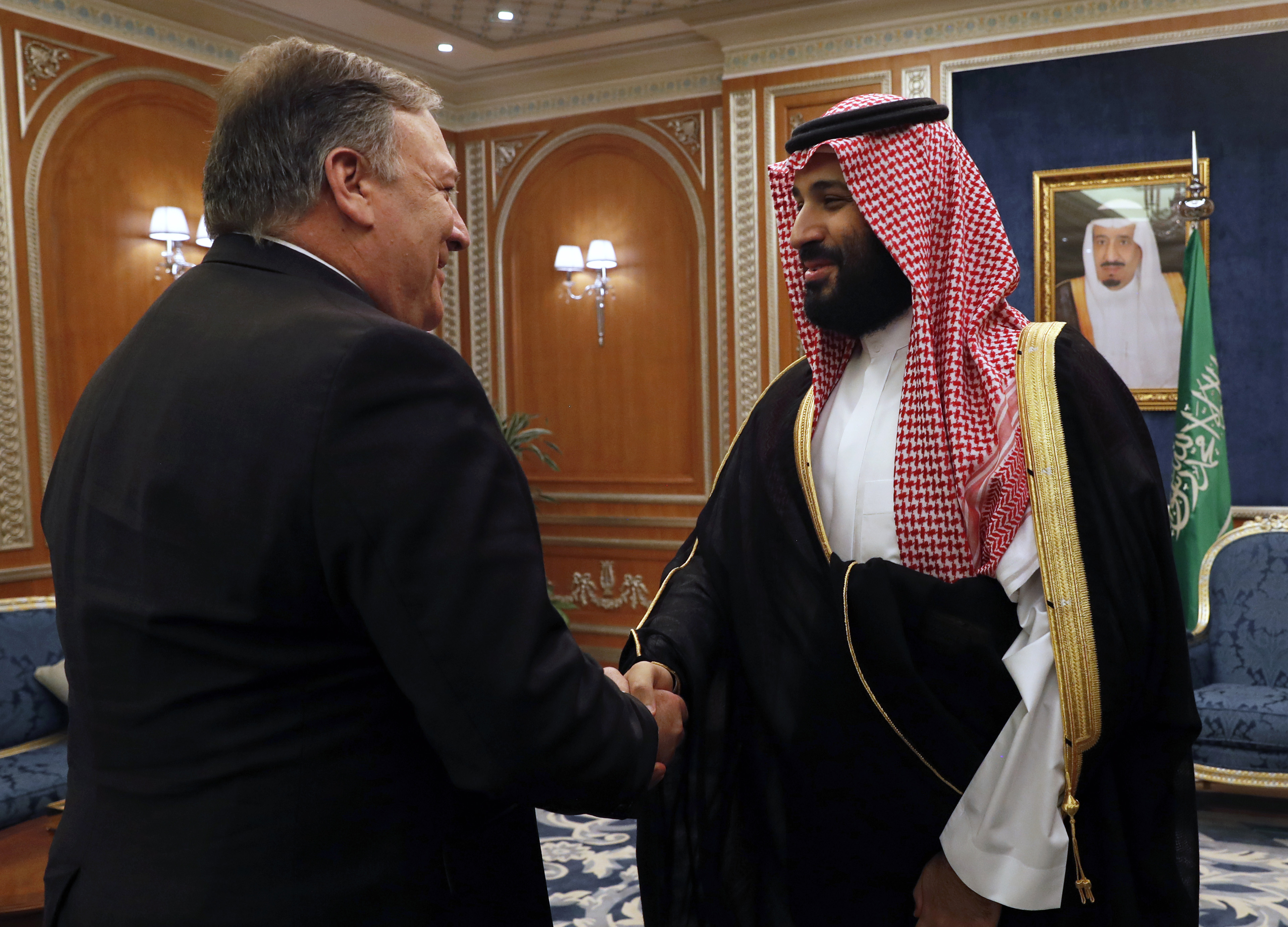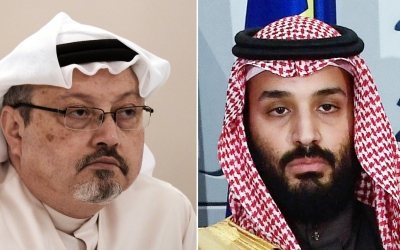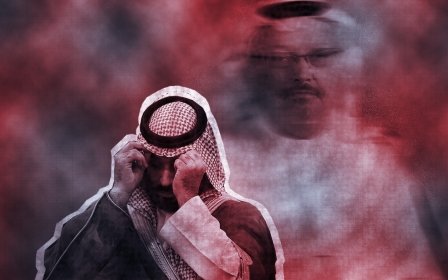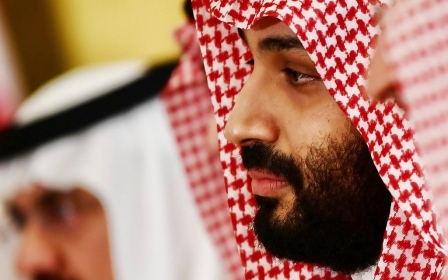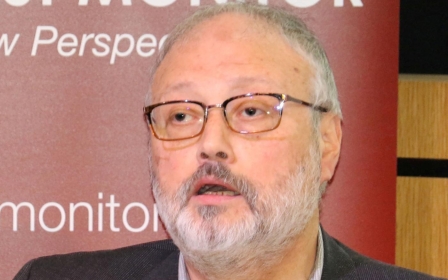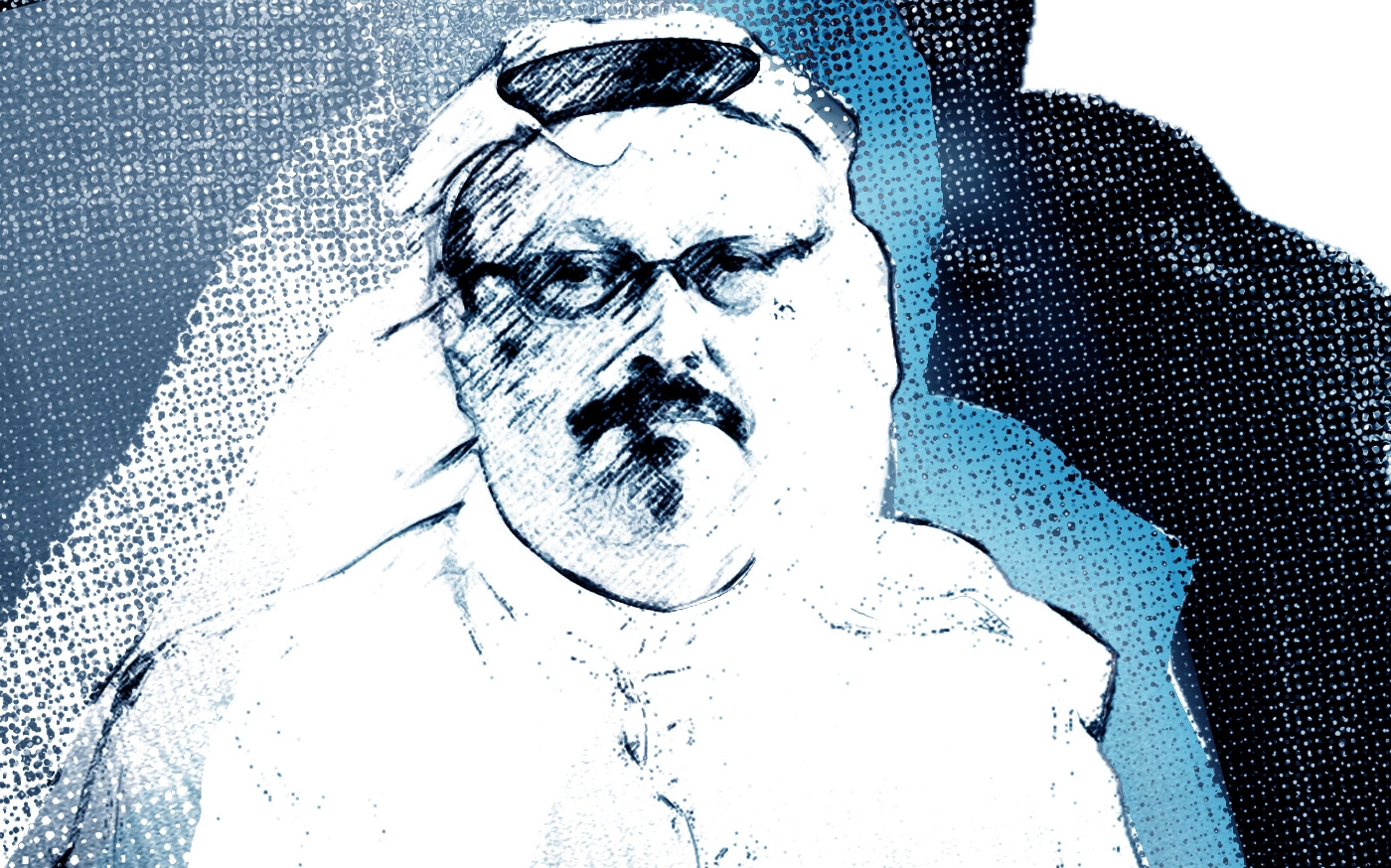
Khashoggi, one year later: 'A promise not yet fulfilled'
Twenty-one days after Saudi government agents killed and dismembered Jamal Khashoggi at the country's Istanbul consulate last October, US President Donald Trump offered his most stern rebuke of the murder, dubbing it a "very bad original concept".
"It was carried out poorly, and the cover-up was one of the worst in the history of cover-ups," Trump told reporters in the Oval Office on 23 October.
Dressed in a black suit and a blue-and-red striped tie, and an American flag pinned to his lapel, Trump sat with his arms crossed across his chest for an entire minute as he denounced the killing. By then, the assassination had spurred international outrage and widespread calls for accountability from the Saudi government and its key backer, the United States.
But only moments later, the US president's posture changed - as did his rhetoric.
"They've been one of the biggest investors - maybe the biggest investors - in our country. They are doing hundreds of billions of dollars worth of investments and you know, so many jobs," said Trump, his arms now stretched out on the desk in front of him and his hands moving around energetically as he spoke.
For many observers, some of whom initially hoped the Trump administration would hold the Saudis' feet to the fire over Khashoggi's gruesome murder, the president's sharp 180 at the White House that day was a preview of the year to come.
Khashoggi was murdered on 2 October - exactly one year ago today.
Yet over the past 12 months, Trump has cited money and weapons sales to protect his allies in Riyadh from calls for accountability, a stance that critics say makes the White House a major impediment in the quest for justice for Khashoggi.
"Somebody in Saudi Arabia gave the order and executed the killing, but the attitude of the president at 1600 Pennsylvania Avenue, the president of the United States, made him an accessory to this crime," said Khalil Jahshan, executive director of the Arab Center Washington DC, a think-tank.
Jahshan, who knew Khashoggi for three decades, said turning a blind eye to the murder because Saudi Arabia buys weapons from the US is a "humiliating" excuse.
"As an American of Arab origin, proud of both... I'm more ashamed of the American handling of the situation than the Saudis'," he told Middle East Eye.
The facts
Last November, Trump said "we may never know all of the facts surrounding the murder", but the president's critics say those facts are central to ensuring that Khashoggi gets justice - and the US has a responsibility to bring them to the surface.
"Justice for Mr Khashoggi has many dimensions, one of which is truth-telling," the United Nations rapporteur for extrajudicial killings, Agnes Callamard, told MEE at an event in Washington last week.
Callamard, who conducted an investigation that concluded Khashoggi's killing was a premeditated "state act" for which the Saudi government was ultimately responsible, said Riyadh cannot be expected to disclose what it knows.
"It is my strong suspicion that a number of American institutions and individuals have the information and credible information," she said. "I think a lot has been done to uncover the truth, but not all, and one of the key actors... is the American government."
Late last year, several US media outlets reported that the CIA had determined that Saudi Crown Prince Mohammed bin Salman was responsible for the killing, and the US Senate unanimously backed that conclusion in December.
'I think relations between the United States and Saudi Arabia will always be affected by this assassination, until there is a credible and transparent investigation'
- Randa Slim, Middle East Institute
But so far, the Trump administration has resisted calls to make public what it knows about the assassination. It has also ignored a legally binding deadline, mandated by the Magnitsky Act, a US human rights law, to inform Congress about whether bin Salman was involved in the killing.
In her report, Callamard urged the US administration to comply with the act. She also called for an FBI investigation into the murder, as well as the declassification and release of relevant information.
Khashoggi was a Virginia resident and columnist for the Washington Post, headquartered a short walk from the White House, when he was killed - something that advocates say places an additional onus on the US to investigate his murder.
"Once the information regarding the chain of command is in the open with no ambiguity, I think it will be quite impossible for the US authorities, meaning the executive, as well as other governments, to hide behind a politics of business as usual," Callamard said.
The crown prince's role
As calls for accountability for Khashoggi's murder have ebbed and flowed over the past year, much of the focus has been on bin Salman, the de facto ruler of Saudi Arabia and a personal ally of key members of the Trump administration.
Also known as MBS, the crown prince sits at the top of the chain of command in the desert kingdom.
The 34-year-old royal was made deputy crown prince when his father, King Salman, ascended to the Saudi throne in 2015. He quickly consolidated power and in his position as defence minister, launched the war against the Houthi rebels in Yemen. He also initiated Vision 2030, an ambitious project to reshape the Saudi economy.
After Trump's election, bin Salman forged close ties with the US president's son-in-law and senior adviser Jared Kushner. And shortly after Trump visited Saudi Arabia in 2017 in his first foreign trip as president, bin Salman was made crown prince and became the face of the kingdom, taking over most of his ageing father's responsibilities.
Bin Salman and other top Saudi officials have repeatedly rejected accusations that he is responsible for Khashoggi's murder, instead blaming the assassination on rogue agents, 11 of whom they say are now on trial for their involvement in the murder.
"Absolutely not," bin Salman told CBS recently when he was asked if he had ordered the killing, though he added that he takes "full responsibility as a leader in Saudi Arabia".
Still, many analysts and advocates rule out the possibility that an operation of that magnitude, which involved a private jet with diplomatic clearance that flew from Saudi Arabia to Turkey on the day of Khashoggi's killing, could have taken place without the authorisation of the crown prince.
After CIA Director Gina Haspel met with US politicians in a classified hearing last December, then-Senator Bob Corker said that if MBS were put on trial, he would be swiftly found guilty of murder.
"I have zero question in my mind that the Crown Prince MBS ordered the killing, monitored the killing, knew exactly what was happening, planned it in advance," Corker told reporters at the time. "Let me just put it this way: If the crown prince went in front of a jury, he would be convicted in 30 minutes."
Yet Trump has fended off calls to hold the top leadership in Saudi Arabia accountable, including attempts by members of Congress to get the administration to make public its own conclusions about the extent of bin Salman's involvement.
In July, the US House of Representatives overwhelmingly passed a bill that would require the US spy chief to identify those responsible for the assassination in order to sanction them. The proposal still needs to pass the Republican-controlled Senate before making it to the president's desk.
"First and foremost we need the White House to get in line with the rest of the United States government and with the public, where they demand that Saudi Arabia fess up to the crime," said Philippe Nassif, advocacy director for the Middle East and North Africa at Amnesty International USA.
Last October, it took Saudi Arabia 17 days to even acknowledge that Khashoggi was killed inside the consulate after first insisting that he had left the building alive. A year later, the whereabouts of his remains are still unknown.
But far from pressuring Riyadh in the immediate aftermath of the killing, Trump and several other top administration officials at times appeared to act like public relations agents for the Saudi crown prince. The US president dispatched Secretary of State Mike Pompeo to meet with MBS on 16 October, when top Saudi officials were still lying about what happened to the Washington Post columnist, who also wrote for Middle East Eye.
The visit did not produce a confirmation of Khashoggi's fate, and Trump told The Associated Press at the time that the Saudis were being treated like they were "guilty until proven innocent".
At an event honouring the late journalist in Washington last week, Congressman Gerry Connolly, a Virginia Democrat in whose district Khashoggi's home was located, berated Pompeo for making the October 2018 trip. The congressman said pictures of the secretary of state laughing with MBS just weeks after the assassination made it clear that the administration was not serious about pursuing justice.
"We will not stop," Connolly told the crowd. "It may take time, but we will get justice for Jamal Khashoggi. And we will insist on accountability from the Saudi government no matter how high up it goes, and we know how high up it goes."
US-Saudi relations
Connolly is not alone. Key members of Congress, including Democratic House Speaker Nancy Pelosi and senior Republican Senator Lindsey Graham, an otherwise staunch Trump ally, have vowed not to allow the murder to be swept under the rug.
"I think relations between the United States and Saudi Arabia will always be affected by this assassination, until there is a credible and transparent investigation," said Randa Slim, a senior fellow at the Washington-based Middle East Institute.
While Trump may be able to protect the crown prince for now, he will not remain in office forever, added Kristian Coates Ulrichsen, a Middle East fellow at Rice University's Baker Institute for Public Policy, who said the murder will be a long-term problem for MBS.
That will be especially true if Democrats take the White House in 2020, Ulrichsen said.
Timeline: How Congress tried to pressure Riyadh in aftermath of Khashoggi's murder
+ Show - Hide24 October 2018: Just over three weeks after Jamal Khashoggi's killing, the US House of Representatives introduces legislation to halt US arms sales to Saudi Arabia in light of the journalist's murder.
10 November 2018: US Democratic Congressman Brad Sherman announces plans to introduce a bill to limit US nuclear technology trade with Saudi Arabia. "I don’t think this bill would've passed prior to the events in Istanbul. Now I think we have a chance," Sherman tells Vox.
14 November 2018: Republicans in the House block a Democrat-sponsored resolution to end Washington's support for a Saudi-led coalition waging war in Yemen. To do it, the Republican majority slips the provision into a bill to remove grey wolves from the protected species list.
15 November 2018: A bipartisan group of US senators introduce a bill that seeks to suspend American weapons sales to Saudi Arabia and prohibit US refuelling of Saudi coalition aircraft in Yemen. The Saudi Arabia Accountability and Yemen Act of 2018 is sent to the Committee on Foreign Relations, but no further action is taken on the proposal.
28 November 2018: The US Senate votes 63-37 in favour of advancing a resolution to end US involvement in the war in Yemen. As a result, the resolution is sent to the House for another vote.
6 December 2018: Senior US senators introduce a resolution denouncing Saudi Crown Prince Mohammed bin Salman for his role in the murder of Khashoggi, as well as the war in Yemen and Saudi Arabia's diplomatic standoff with Qatar.
12 December 2018: In a 60-39 procedural vote, US senators move forward with a motion to end Washington's assistance to Saudi-led forces in Yemen. The resolution must still come up for a vote, however.
Earlier that day, politicians in the House narrowly pass a provision to prevent triggering aspects of the War Powers Resolution, which gives Congress the power to withdraw the US from wars that don't have its authorisation.
13 December 2018: The US Senate - in a 56-41 vote - adopts a symbolic resolution stating that it "believes Crown Prince Mohammed bin Salman is responsible for the murder of Jamal Khashoggi".
30 January 2019: Members of the Senate and House announce plans to re-introduce a bill requiring the Trump administration to stop providing logistical support to the Saudi-led coalition's war in Yemen.
13 February 2019: The House in a 248-177 vote passes a resolution to end Washington's support for Saudi-led forces in Yemen. The resolution is sent to the Senate.
26 February 2019: Five Democratic senators introduce a bill to push Trump to produce a public report on Khashoggi's killing. The proposed legislation comes weeks after the Trump administration missed a deadline under the Global Magnitsky Act to release findings that would identify who was behind Khashoggi's murder.
13 March 2019: The Senate passes a resolution to end US involvement in the war in Yemen. The motion is similar to a resolution passed in the House on 13 February, but it is considered a different piece of legislation.
4 April 2019: Following the Senate's 13 March vote, the House passes the resolution to end US support for the Saudi-led war in Yemen - sending it to Trump's desk for ratification.
16 April 2019: Trump vetoes the congressional resolution that sought to end US involvement in the Saudi-led war in Yemen.
24 May 2019: The Trump administration says it will invoke an emergency provision to bypass Congress and allow the sale of more than $7bn in arms to Saudi Arabia and the United Arab Emirates.
18 June 2019: US Senator Bob Menendez starts the legislative process to block Trump's attempt to bypass Congress on the weapons sale.
16 July 2019: The House votes 405-7 in favour of a bill that would require the director of national intelligence to publicly identify the people involved in the murder of Khashoggi and impose travel sanctions on them. The bill is sent to the Senate, where it is read twice and referred to the Committee on Foreign Relations, but no further action is taken.
31 July Committee on Foreign Relations: US senators introduce a fresh bill that would direct the US intelligence chief to produce a report to Congress on the role that any Saudi government official or political figure may have played in Khashoggi's murder. It is read twice and referred to the Committee on Foreign Relations, but no further action is taken.
In a crowded Democratic primary race in which candidates are vying for the votes of Trump-weary Americans, many presidential hopefuls are taking a more hardline approach to Riyadh. Bernie Sanders and Elizabeth Warren, two of the leading candidates, have been outspoken critics of the kingdom.
Ulrichsen said the outcome of the 2020 US election may trigger a reassessment of American partnerships in the region more generally, as well. "It's going to be difficult for this to blow over any time soon," he said.
Shock
Yet for all the upheaval that his murder caused, Khashoggi never identified as a dissident.
While he criticised some of the crown prince's policies, Khashoggi also praised MBS for easing some of the country's ultra-conservative social restrictions. And for most of his career, he worked for pro-Saudi government newspapers and served as a media consultant to royals, often operating as a de-facto spokesman for the state.
But it was Khashoggi's status as a former insider that made his criticism so threatening to bin Salman, said Ulrichsen. "Because he had been a part of the system for 30 years, he knew so much that could present an alternative story line, which made him essentially a danger to the current establishment," Ulrichsen told MEE.
Khashoggi was also based in Washington, a place where bin Salman sought to build his influence and find backing for his various domestic and regional policies, including the Saudi stand-off against Iran and the country's war in Yemen.
'The attitude of the president at 1600 Pennsylvania Avenue, the president of the United States, made him an accessory to this crime'
- Khalil Jahshan, Arab Center Washington DC
Still, the murder came as a shock for those who knew the late journalist because of its gruesome nature and astounding setting: a diplomatic post in a foreign country. "I don't think anybody imagined that what had happened in the consulate would take place, which is why the shock has been so great," Ulrichsen said.
"I was surprised he'd gone in the first place... Initially, I thought something was wrong because clearly if he hadn't come out, something was a problem. I was personally quite concerned and hoping that there was an explanation."
Stephen McInerney, the executive director of the Project on Middle East Democracy (POMED), a Washington-based think-tank, had a similar experience, saying the initial news that Khashoggi had disappeared left him "shocked and appalled".
"But also we knew that individuals like Jamal who are willing to speak out publicly about the authoritarian governments that rule their countries are at risk," McInerney told MEE.
And as horrifying as the assassination was, it was "not out of character for the Saudi regime", he added. "It was in line with the brutality that Mohammed bin Salman has demonstrated since he came to power. He took power through brutality."
'A promise not yet fulfilled'
Ezzedine Fishere, a novelist and visiting professor of Middle Eastern politics and culture at Dartmouth College, also said he was initially taken aback by the news of Khashoggi's disappearance.
A former Egyptian diplomat, Fishere had known Khashoggi since 2012, when he met him on various panels and events on the Middle East taking place in the US.
Although the two did not see eye-to-eye on all issues, Fishere said Khashoggi was intellectually sincere and had the ability to question his own beliefs - a "rare quality" that turned conversations into an exchange of ideas, not just debates to prove a point.
"He was capable of stopping in the middle of a conversation and weighing in opposing views and thinking about them," Fishere said. "He was careful not to offend while being outspoken… And he listened and was a great guy in this sense."
Khashoggi's primary hope was for the Middle East to be democratic, "modern, and not trapped in the past", Fishere said, and he wanted the people of the region to be open to the rest of the world.
Indeed, in his last column for the Saudi-owned Al-Hayat newspaper in 2017, Khashoggi quoted the late Saudi King Abdullah as saying, "We cannot remain the same as the world around us changes".
The article, titled "I am Saudi, but different", promoted the "right to disagreement" and portrayed a collective Saudi identity built on a mosaic of ideologies, comparable to America's motto E Pluribus Unum - out of many, one.
Ultimately, Fishere described Khashoggi as "a promise".
"Jamal was on an intellectual journey that wasn't completed. And I think one of the tragic aspects of his premature departure is that this journey is not complete… He was a promise, and that promise was not yet fulfilled."
- MEE's Umar Farooq contributed to the reporting from Washington
- Cover illustration by MEE's Mohamad Elaasar
Middle East Eye propose une couverture et une analyse indépendantes et incomparables du Moyen-Orient, de l’Afrique du Nord et d’autres régions du monde. Pour en savoir plus sur la reprise de ce contenu et les frais qui s’appliquent, veuillez remplir ce formulaire [en anglais]. Pour en savoir plus sur MEE, cliquez ici [en anglais].


